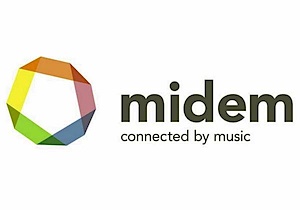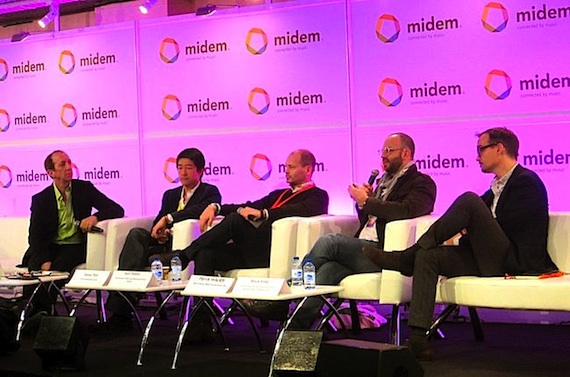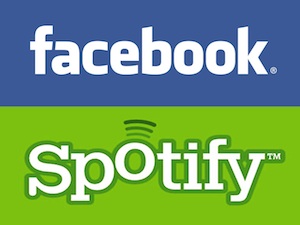
 MIDEM: Day One (1/26/13)
MIDEM: Day One (1/26/13)
The annual MIDEM gathering opened Saturday (Jan. 26) in Cannes, France. The weather was much more agreeable this year; it was sunny and in the 50s as opposed to last year’s constant cold heavy rain. The event runs from Jan. 26-Jan. 29. There were many comments from long-time MIDEM attendees that “it ain’t what it used to be.” Indeed, that’s true; in 2001 there were probably 12,000 participants swarming the Palais; this year there will likely be just under 7,000. The traditional music industry of major corporations is finding it less useful but for independent labels and “partners” seeking to use music with their new apps and other products as well as music companies trying to find new outlets for revenue, it is an important—probably essential—conference.
There were two topics that continued to emerge during the first day. First was artist-to-fan connections and how to achieve them. The other topic was the problems with rights clearances, particularly from the music publishing industry. Over and over, you hear that internationally, publishing is quite complicated and difficult, especially when many songs have several writers and several publishers and obtaining permissions is costly and time consuming.

Pictured (L-R): moderator Tom Silverman, CEO of Tommy Boy and executive director of the New Music Seminar; Daren Tsui, CEO of Mspot, Samsung’s music hub; Ken Parks, chief content officer and managing director of Spotify; Patrick Walker, YouTube’s senior director of music content partnerships for Europe Middle East & Africa; and Mark Piibe, Sony Music’s exec VP of global business development and digital strategy.
“Building The 100 Billion Dollar Music Business”
During one seminar, “Building the 100 Billion Dollar Music Business,” Ken Parks, Chief Content Officer and Manager Director of Spotify said, “We have to grow this business by growing the pie, not by getting more out of the existing pie.” That seemed to be a common thread on the first day of the conference. The other common thread was Direct-to-Fan marketing.
Panelists for that seminar were Patrick Walker with YouTube, Parts, Mark Piibe with Sony Music, Daren Tsui with Samsung Mspot, Jerry Johnson with Microsoft’s Xbox music and Tom Silverman with Tommy Boy Entertainment and the New Music Seminar.
According to Parks, Spotify has had a positive effect on the Swedish music industry. “When Spotify started, the Swedish music business was dead, but now we’ve seen growth,” he said. “A large percentage of Sweden subscribes to Spotify.” He also noted that the music industry sales in Norway is up 7 percent. “We have proven that it’s possible to get young people between 18 and 24 to pay for music,” Parks said, adding that “most of our customers playing monthly fees are between 18 and 24.”
YouTube had a major presence at MIDEM with a number of executives at the event. Patrick Walker, Sr. Director EMEA, YouTube Music (UK) noted that YouTube “pissed off a lot of labels.” “We still get the pitchforks and torches from time to time but we’ve been converting to a revenue source for them,” he said.
Tsui stated that “We’re still dealing with content. Our top executives at Samsung believe music is very strategic. Most people know Samsung for the Galaxy phones but we’re the largest electronics company in the world. We do pretty much everything with electronics.” He noted that Samsung is aggressive, stating “We want to offer music in every country we offer Samsung products. We have 200,000 employees and offices in 70 countries.”
In terms of cooperation with the music industry, Tsui stated that Samsung “is getting help” but is “running into the same issues as everyone else,” noting that “publishing is super complicated around the world.” In terms of mobile phones, Tsui noted that Samsung sells “almost doubles the nearest competitor” in smart phones but added, “we also sell a lot of feature phones.”
Silverman said “We used to have the exposure business—without revenue. The record labels spent a lot of money and didn’t get any income from that. Now the places we’re getting exposure through outlets like YouTube and Spotify and we’re receiving revenue from them.”
Walker chimed in, saying that YouTube has changed how many aspiring artists hope to be recognized within the industry. “YouTube has become a hunting ground for those hunting talent. Some hope to get discovered on You Tube and get a big contract with a major label but now it’s possible to get discovered by fans and make money with exposure on YouTube.“
Nobody could explain PSY’s “Gangman Style” receiving a billion views on YouTube. However, it was noted that in addition to those billion views, there were “hundreds of thousands” of views of “Gangman Style” take-offs and parodies. Silverman noted that during the 1970s Sugarman recorded two albums that went nowhere in the United States but were huge hits in South Africa. “If those albums had been released today on YouTube they would have been worldwide hits,” said Silverman, due to the international reach of the popular internet site.
MIDEM: Day Two (1/27/13)
The second day of MIDEM offered a full slate of seminars, panels and speakers as well as booths providing information about music product from nations, entrepreneurs and services.
“Music Industry 101–What the Digital Music Market Needs From You”
 In a session titled “Music Industry 101—What the Digital Music Market Needs From You,” speaker Mark Mulligan, an Analyst and Consultant with MIDIA Consulting (UK) stated that “YouTube is where the music industry is going. Some artists are not album artists,” stated Mulligan, who cited dance singles from artists who don’t need an album. Further, “every artist doesn’t need an album,” he asserted, because an artist can be successfully marketed through singles.
In a session titled “Music Industry 101—What the Digital Music Market Needs From You,” speaker Mark Mulligan, an Analyst and Consultant with MIDIA Consulting (UK) stated that “YouTube is where the music industry is going. Some artists are not album artists,” stated Mulligan, who cited dance singles from artists who don’t need an album. Further, “every artist doesn’t need an album,” he asserted, because an artist can be successfully marketed through singles.
In the future (and present) an artist “must become a businessman because music sales can no longer be relied on to provide a decent living,” said Mulligan. “The playing field is both more even and more complex than it has ever been [because] digital music has forced artists to be more business aware and business savvy.” Mulligan stated that “an artist needs to spend more time with fans, who may play a role in shaping what the artist’s music sounds like.” Mulligan quoted Jay-Z, who once said, “I’m not a businessman; I’m a business, man!”
Mulligan continued, saying that artists need to embrace “new opportunities to create closer relationships with fans, work with a diverse range of partner companies and enter more innovative relationships with label” to be successful. For the “creative who want to be purely creative” and say aloof from fans, “they should not expect to have the same level of commercial success” as those who are actively engaged with fans.
Mulligan noted that “10 percent of music buyers account for 40 percent of sales and that 60 percent of music buyers account for only 18 percent of sales,” and that “10.5 percent of buyers stopped buying music in the United States [because] they didn’t get the move from owner to access.”
Mulligan wasn’t very optimistic about the music industry in the short term, saying that “it will be at least five years” before the industry settles. “Changes will need to move to digital in a number of markets where CDs still dominate.” There seemed to be a bias against digital with many of the speakers, although physical sales continue to be strong in the United States (roughly 50 percent of income), the U.K. (60 percent) and the Benelux countries (85 percent).
Mulligan noted that the role of the artist must be “more like a business” and that there’s still too much “free” product in the market. He noted that, although there are more revenue streams for artists, money from merchandise and other revenue streams “isn’t going back into the music industry.” Further, ancillary incomes do not affect all aspects of the industry. “Merchandise means nothing to songwriters,” he said, noting that “lots of revenue streams are unrelated to the music industry.”
For years, the CD has been the bedrock of sales for record labels and, although digital sales are growing, “it’s not enough to pick up the slack” from sales lost when physical sales started declining after 2000. Mulligan noted that digital sales went up sharply until 2008; at that point sales of iPods stopped growing. “When Apple sneezes, the music industry catches cold,” said Mulligan, who attributed a decline in the growth of digital sales to Apple, “who took their focus off music.” He added that “nobody is taking the role of Apple,” although he mentions that Spotify is making significant contributions.
Mulligan stated that “piracy is not going away. It will always be part of the mix,” and that although Spotify “reduces the amount of piracy, there were very few who stopped pirating music even though they listened to Spotify.”
Discussing the issue of 360 deals, Mulligan noted that these are “good deals if done in the right way. That “right way” involves labels helping artists gain and grow other revenues. Labels need to add value and become more involved in direct-to-fan marketing.”
The emphasis on “brand marketing” has its drawbacks according to Mulligan, who stated that “it is not easy for a partnership because the brands want someone already famous. They don’t want to invest in or develop an unknown.”
“Mainstream music buyers will disappear,” stated Mulligan, who wondered “if it’s worth getting them back” when the top 10 percent of buyers buy 40 percent of the music. Further, these buyers are, on the whole, not digital buyers and many don’t even buy online.” Mulligan noted that in France, “20 percent of buyers only buy in brick and mortar stores.”
“The decisions will be made for the industry, not by the industry,” stated Mulligan, “as music will become a commodized service with little artistic value.”
These challenges create the need for “innovative imperatives,” said Mulligan, who added that labels need “to create the next generation of the digital age and establish new models for artist relationships” if they are to be successful.
“It is getting harder for an artist to make a decent living from music,” said Mulligan. “A label has a large number of albums to sell but an artist only has a few, so it takes longer for an artist to generate significant income.” Further, “the long tail was not as productive as once thought,” so there is a more limited demand for old product than originally thought.
“Innovation is imperative,” said Mulligan, who advised the industry to “avoid rights complexities” to eliminate or minimize problems when there is an opportunity for an artist’s music to be part of other revenue streams.
“Next Gen Retailers: The Real World Strikes Back”
The seminar, “Next Gen Retailers: The Real World Strikes Back” featured panelists Kim Bayley with the Entertainment Retailers Association (UK), Martin Goldschmidt with the Cooking Vinyl Group, Michael Kurtz, president of Department of Record Stores and co-founder of Record Store Day, and Keis van Weigen, president of Rough Trade Distribution; the panel was moderated by Dick Huey with Toolshed.
Huey opened the session with an open question to the panelists: “What do we need to be doing to add value?”
“We don’t need to divide our customers between digital and physical,” answered Bayley. “Customers do both and it’s been proven that those who do both spend twice as much money on music.”
Goldsmith noted that “for many years the labels forgot who our customers were. We thought it was record shops instead of end consumers.”
“We need to engage people who share the same passion for music,” said Kurtz, who added that “Record Store Day” started out by accident. “There was a Metallica album coming out and we wanted to declare a ‘Holiday for Music,’” he said, adding that, “Nobody owns Record Store Day.” Kurtz continued that “We must blow away the concept that convenience is everything. We had a long line of people standing in line to purchase a Beach Boys 10-inch 78 that almost nobody could play. There are also ‘Special Editions’ that are pieces of art created just for the fan that are in demand from collectors and dedicated fans.”
Addressing the issue of “super serving the consumer,” Huey used the example of Nashville-based Jack White’s Third Man Records, who has a truck that brings recordings to people like a Book Mobile used to.
One idea for “super serving the customer” was putting digital download cards in vinyl albums “to give the consumer a digital convenience with a physical product,” said Bayley. However, there have been problems with publishers, according to panelists, who want the customer to pay mechanicals for both the vinyl and digital album, thus increasing the cost of the vinyl product.
“Our job is to get the customer to pay,” said Goldschmidt. “If they paid for it once, they shouldn’t have to pay twice but publishers make us pay twice. That doesn’t give the customer a good experience. Publishers need to see this is a problem for everyone because sales will be lost.”
Kurtz stated that five years ago, “vinyl sales had dwindled to 50,000 or so a year. Now it’s in the millions of units and pressing plants stay busy. We told the labels that we needed to put a digital option into the vinyl album but most of them ignored us. They had lost track of the consumer experience.”
“There have been some serious discussions between labels and publishers,” said Goldschmidt, “but no discussions about how we can make the business better. It’s a lose-lose situation.”
The demand for vinyl used to come from “the bald spot and pony tail group” said Kurtz, who added, “we always said that lovingly. But the new generation loves vinyl and the record store experience and has made that cool. We used to have no young girls applying for jobs in our store and you always want young girls working in your store. Now, with this surge in vinyl sales, about 50 percent of our staff is young girls.”
The issue of online sales from Amazon and iTunes was addressed as the panelists noted that “Amazon had a huge advantage because they didn’t have to pay sales tax,” while local sales had to collect sales taxes, making a product more expensive. “This was a major reason that consumers bought online instead of locally, which hurt not only brick and mortar retailers, but governments as well, who were deprived of sales tax income and now face huge budget deficits and must reduce or eliminate services.”
“We’ve had a horrible situation in the U.K. with HMV,” said Goldschmidt. “The same with Virgin in France. They have gone into administration. These chains and others going into administration are paying corporate taxes so the government is losing a massive amount of tax money. Meanwhile, online retailers aren’t paying any tax. This is not only hurting the music business; it’s hurting society.”
The issue of “exclusives” came up and the retailers generally resented it, saying “if I’m a Spotify consumer and it’s on something else, then I’ve lost it” and that “every release should be available everywhere,” though Goldschmidt stated that “it works in marketing,” even though non-major retailers dislike it.
“No one can argue with the success of Taylor Swift,” said Kurtz. “And that release [Red] left out indie record stores.”
“Exclusives offer a short-term gain for a long-term loss,” said Goldschmidt. “In the long term there are sections of retail cut out. We must find creative ways to engage all channels. We’re losing High Street for a variety of short-term reasons.”
“European Union Addresses Music Industry Issues”
During another seminar, titled “European Union Addresses Music Industry Issues,” Michael Barnier, recently named European Commissioner for Internal Market & Services for the European Union spoke to an audience at MIDEM on issues directly affecting the music industry and plans he would like to see enacted through EU to solve those problems.
“Europeans are frustrated because they are not able to access content,” said Barnier. “ There are too many restrictions, too many are denied access to sites and the availability of the internet is uneven in various states. It is not just music lovers but investors who are hurt.”
A “Single Market Act” was submitted to the EU because “there are many barriers to the internet” in the EU. “We are behind the Americans in this,” he said.
“Authors’ rights should not be a convenient scapegoat for lack of access,” he continued. “We must create a policy for cross-border portability for online services and assure continuity of services when people travel with their smart phones and electronic devices.”
The rights of creators must be protected but must not be a hindrance, asserted Barnier. “We cannot give the impression that everything is free today. We must have our collection societies collecting money for authors and other creators.”

Paul McGuiness, manager of U2
“The rest of the world has extraordinarily diverse standards of integrity,” said Paul McGuinness, manager of U2. “Some people seeking licenses suffer from an integrity deficit and they should not get those licenses. Spotify and YouTube are main distributors but sums of money passing through those services are quite trivial. Google will be the biggest distributor of all but there is a sense of unease with that. There are privacy issues, currency transfers and lack of taxes paid.”
“Google has brought much good to civilization through the spread of knowledge,” continued McGuinness, “but I wish they would apply their geniuses to stopping links to illegal sites and focus on some micro transactions with illegal downloads. I can’t understand why the geniuses who brought us Facebook and Google don’t do what they could be doing.”
“I met the Google bosses at Davos,” said Barnier. “I am very impressed by the players who have a played a positive role in education and the dissemination of knowledge. But in an internet ecosystem we need to change how values are perceived. Authors and writers are not being paid or protected. We see our public budgets shrinking. These funds could be used to upgrade networks and those who use these networks should pay for their use. That subject is on the table.
“If we are not together, we will all be weakened. This is not an option; this is an essential factor. We must defend our culture. If not, we will be sub-contractors to China and the United States. We do not want to be under the influence of China or the U.S. in politics or economics.”
“I am a politician,” continued Barnier. “We need to understand that we must never stray too far from economics. That means we must address entities that are not paying creators and not paying governments. I am fighting for a unified Europe. We will soon be 28 countries with 24 languages. We must keep regional identities but work together in defense of our policies with economics and the intelligent protection of authors, musicians, lyricists and all those who create. We need to understand piracy, bring it under control but not alienate young people.”
For an overview of Day 3 of MIDEM, catch MusicRow’s writeup here.

About the Author
Don Cusic is Professor of Music Business at Belmont University. He has authored 18 books, including his most recent “Discovering Country Music.”View Author Profile



